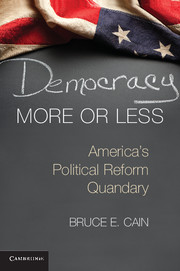Book contents
9 - A Blended Reform Agenda
Published online by Cambridge University Press: 05 December 2014
Summary
The democratic imperative has shaped American politics and institutions in both good and bad ways: shifting the meaning of political corruption from official self-enrichment to democratic distortion, imposing conflict-of-interest rules on elected officials, opening up government through transparency measures, democratizing party nomination processes, and creating new opportunities for citizen governance though popular initiatives and experiments like participatory budgeting. The idiosyncratic structure and antiauthoritarian premises of US government have also guided and constrained America reform efforts distinctively. The Electoral College and the US Senate are constitutionally entrenched exceptions to “one person, one vote” electoral equality. The Supreme Court’s strong interpretation of First Amendment rights has blocked efforts to use campaign finance to create greater political equality. Election administration decentralization is a serious obstacle to achieving a uniformly fair political process. And the paths to fixing many of these problems with structural reforms at the national level are effectively blocked by politics and high institutional barriers for the foreseeable future. The latter is what Amy Guttman and Dennis Thompson call the reformer’s dilemma: “Most institutional reforms cannot get off the ground without changing some of the conditions that the reforms are intended to fix” (Gutmann and Thompson, 2014, pp. xx–xxi).
The pressure to expand democratic procedures will not likely abate. Fueled by a confluence of factors – inevitable disappointments with representative government, rising expectations of a more educated electorate, a general tendency to overestimate citizenship capacity and the allure of e-government – neopopulist reformers will continue to challenge older democratic practices and institutions. The democratic imperative has made some important contributions to American political reform – such as the expansion of the franchise or freedom of information laws. And a moderated populism (i.e., one that supplements and does not attempt to supplant representative government) can complement neutral expertise and pluralism.
- Type
- Chapter
- Information
- Democracy More or LessAmerica's Political Reform Quandary, pp. 194 - 216Publisher: Cambridge University PressPrint publication year: 2014



